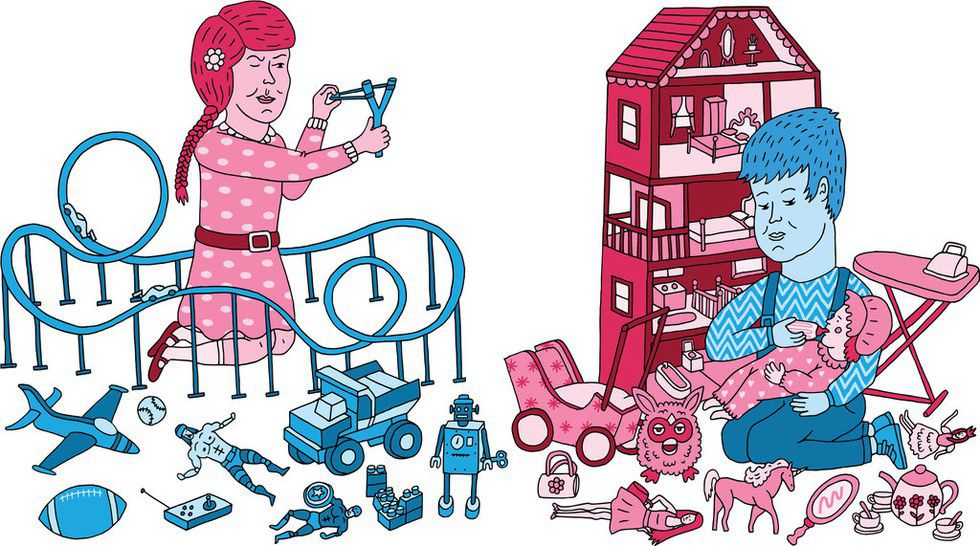A varied group of individuals is assembled in a circle, discussing numerous subjects, when a single word manages to elicit a sudden discrepancy in response: patriarchy. Several women nod, one or two men remain quiet, and a few let out an exasperated sigh. It is clear that this subject means more than one thing to the participants in the group. I have experienced a similar situation: some people associate the subject with their own societal struggles, while others feel immediately bombarded or reluctant to comment.
Why the lack of mutual agreement?
As is with any topic, the serious subject of the patriarchal society is discussed and analyzed both correctly and incorrectly, with some lines tentatively drawn. Certain individuals will approach the topic rationally, while others play into emotions and ignore studies and intellectual works. No single group is at fault: there are women who blame men for deeply rooted societal issues, and there are jaded men who refuse to listen to well-constructed arguments after hearing an uninformed one. In this particular discussion, I would like to highlight the responsibility of both men and women in opening the issue of patriarchy and toxic masculinity, which refers to the harmful effects of the patriarchy on men. A discussion on the patriarchy is incomplete without the acknowledgement and analysis of its effects on men. Addressing these effects allows individuals to develop a broadened understanding of the topic and encourage men to feel comfortable in their masculinity rather than trapped in it.
To begin a brief look into toxic masculinity and its influence on men, we can first take a look at a documentary by The Representation Project titled "The Mask You Live In," which shows boys and men being bombarded by ideas of hypermasculinity, violence, and a need to assert a dominant and inherently misogynistic role in society. The trailer addresses the suppressed emotions within men that can lead to mental illness, homicidal and suicidal actions, and a problematic association of respect and violence. By highlighting the ways boys are forced from a young age to separate themselves from women through ideals of apathy, violence and aggression, the video sparks conversation about the pain buried deep within male bodies and the inability to target the source of the issue.
A false and commonly imposed view of masculinity is that it avoids all things feminine (or societally viewed as feminine). Immediately, this concept forces sexes into harmful roles, and both sexes are pressured to abide by definitive standards. For women these roles pose many limits, and such limits are articulated and made available through many books and online sources (if you wish to familiarize yourself). However, this discussion will focus on the male and how he is told from a young age to suppress his emotions, communicate with apathy and violence, and refute any remotely feminine concept.
What are some specific ways that toxic masculinity affects men? I will provide a variety of prevalent harmful stereotypes: Men are strong and therefore showing emotion is not compatible with strength. Men are only interested in sex and are not interested in parenting or raising children. Men must be prepared for violence and expected to react violently in order to assert power and dominance. Men must avoid being emasculated: this means condemning "frivolous" things such as cute animal videos, sugary drinks, and appearance-related hobbies. Men must always know what to do and be leaders. For every woman who is wrongly taught to use her appearance to seek a wealthy man, a man is taught to overwork himself so that he can be viewed as a money object. It is shameful for a woman to lead a man. A submissive man is not a real man, and real men exude confidence which can be seen in a physical strength, superior knowledge and aggressive behavior.
Heard any of these before?
Ideas that reinforce toxic masculinity encourage violence in men as a direct response to proving the anti-feminine, and such violence can result in serious crimes and incarceration. Once incarcerated and making up 93 percent of prisoners, men are faced with environments of sexual harassment and assault, elevated hypermasculine assertions of aggression, and minimal or nonexistent support for mental illnesses that result. The prevalence of prison "rape jokes" is a constant reminder of our inability to treat sexual violence against males as the horrible crime it is.
Furthermore, toxic masculinity prevents men from seeking help after sexual assault, especially since male victims are seen as weak, emasculated and robbed of a contrived identity. A lack of support for male victims can contribute to several violent reactions, whether in the form of suicidal and homicidal violence or general aggression toward others. Because the anger response is engrained and normalized, it is commonly observed in males who otherwise have no way to cope with the crushing weight of unrealistic expectations.
Studies claim that “males take their own lives at nearly four times the rate of females and comprise approximately 80 percent of all suicides," making it clear how much of a toll this forced identity takes on individuals. For the males who do not attempt or commit suicide, there is a stigma attached to receiving counseling, talking about feelings and showing affection toward male friends. This closeness and necessary human support is deemed "feminine" and discouraged among males, leading not so surprisingly to attitudes of . . . that's right, you guessed it—homophobia and transphobia! Transgender visibility is somehow seen as threatening to the traditional hypermasculine identity, and it confuses men who have been taught to view masculinity and femininity in such concrete terms. These specific gender stereotypes thus encourage violence against those who do not conform, which is yet another example of physical violence that results from a toxic mentality.
Self-proclaimed political essayist and cultural critic Chauncey DeVega addresses toxic white masculinity by noting that "toxic white masculinity defaults to violence as a means of maintaining social and political control. It clings to guns as a symbol of “real” male identity. It fears women as equals; it lashes out at non-whites who are somehow “stealing” white men’s jobs and power. Toxic white masculinity sees “liberals,” “progressives,” “social justice,” and “feminism” as enemies—out of a fear that “white masculinity” will somehow be made obsolete or extinct." The initial response to a subject like this is is often anger and denial, especially from those who feel that they are being "called out." However, calling attention to the concept is separate from placing the blame on groups of individuals. Says DeVega, "Denial and anger are a very normal reaction when an uncomfortable truth is called to account." The topic will always remain far from comfortable, but this is the point. For the sake of men and women, it is necessary to point out how society functions by taking false ideas of masculinity and favoring certain individuals over others. A man can be privileged in his gender and ethnicity and still suffer the violent repercussions of a hypermasculine society. Male suffering as a result of toxic masculinity is not acceptable and deserves attention.
A Time article focusing on modern masculinity proposes that men and women work together to dissolve false gender stereotypes and create a society that ameliorates male and female struggles. Due to toxic masculinity's forceful separation of genders and fostered animosity between sides, it is certainly a challenge to break the bonds that keep many men and women in their stereotyped prisons. The article advises men and women to work on encouraging paternity leave, stay-at-home dads, and men in traditionally female professions, as well as for the media to reshape the image of the "typical man." This man is usually portrayed as irresponsible, sexist and aggressive, and it is this man that dominates the television screen and speaks to young males. A different male persona must emerge in the media: one who is responsible, caring and dedicated to his family. Educationally, we must examine curriculums that favor one gender over another and stereotype certain careers as masculine and others feminine. By bringing men into the conversation and addressing not only the negative effects on women but on men as well, we can hopefully build better relationships and heal the damage we have all done.
For those who are in denial, I will reiterate: Men are sensitive, caring, creative, emotional and capable of forming healthy and close relationships with one another. Men are not inherently violent, angry, sex-crazed, irresponsible, apathetic or aggressive. There is no need for men to always be in charge and in control, nor is there shame in not knowing what to do. Male sexual assault victims deserve validation and appropriate support. Those who suffer mental illnesses deserve support. Men can do any and ever single thing that is deemed "feminine." "Feminine" characteristics and activities are constructed as such and have absolutely no bearing on a man's character . . . he should be able to enjoy whatever he chooses and maintain a positive sense of self. Men can show their strength through other actions besides aggression, violence and physical stature—in fact, men do not have to prove their strength at all. As true as all of these statements are, it will take a lot more than acknowledging the pressure on men to alleviate it. Men and women will have to directly work against the normalization of toxic masculinity for people to begin to realize the toxicity of gender stereotypes.
It is not a question of whether males or females have it "worse," as both genders are affected by toxic masculinity. It is not a question of who to "blame" for the existing problems of today. On the contrary, the subject should encourage both genders to observe how toxic ideas emerge and are normalized and taught to children from a young age. Both men and women can understand and seek to dismantle the ways our society forces men and women into dangerous categories and perpetuates violence and apathy on both sides. Every single individual is responsible for acknowledging the widespread dangers for both genders and actively seeking to change the ways boys are forced into aggression and girls into submission.


























